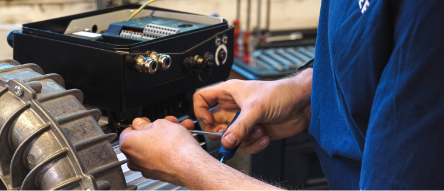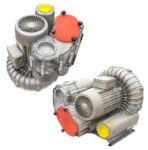It’s common for purchasing managers to choose a vacuum pump at or near the lowest price available. However, the quality of the pump significantly impacts the cost and performance of the pump over its lifespan.
In this article, we dive into the many factors affecting the lifetime cost of high-quality pumps versus cheaper pumps and show why price points can be deceiving and should not be the sole deciding factor in choosing a pump.
THE EFFECT OF QUALITY ON PERFORMANCE & LONGEVITY
The quality of a vacuum pump can impact its longevity, with lower-quality pumps demonstrating a shorter lifespan than higher-quality products. High-quality pumps and parts ensure reliability and durability as well as consistent performance.
Suppliers of high-quality pumps usually provide consultation with a specialist who will help determine the optimal solution for the application. For achieving the best results from your purchase, it’s crucial to make the right pump and accessory choices – an important step that is often overlooked.
In addition, suppliers of higher-quality products typically offer spare parts and after-sales services, which may not be available for low-budget solutions.
FOCUS ON TOTAL COST OF OWNERSHIP
One useful tool for making informed decisions that consider both quality and cost-effectiveness when selecting vacuum pumps is the “total cost of ownership”, or TCO.
To evaluate the quality factor against up-front costs, it’s helpful to calculate and compare the TCO of competing pumps for the first two and five years of operation. You may discover that replacing a pump every two or three years versus every eight or ten years, even if lower in cost, will ultimately cost more as the years go by.
WATCH FOR HIDDEN COSTS
By solely considering just a few factors, such as the upfront price of a vacuum pump, certain hidden costs that contribute to the TCO may be overlooked.
Calculating the TCO requires breaking down the factors that affect the lifetime costs of a pump, some of which may not be obvious or easily defined. These may include:
- Lifespan of the pump
- Maintenance intervals & cost of labor and consumables
- Cost for part replacements
- Energy efficiency
- Easy availability of parts and services
- Opportunity cost of machine downtime
IMPACT OF QUALITY ON MAINTENANCE REQUIREMENTS (AND MAINTENANCE COSTS)
Selecting the lowest-price vacuum pump option not only sacrifices quality but can also lead to a higher TCO through higher maintenance and energy costs.
For example, a lower-quality pump may be less efficient, requiring more energy for the same amount of vacuum produced. A less-well-built pump may lose efficiency due to leaking oil or worn parts, adding more repair and replacement costs.

A lower-quality, low-cost vacuum pump may require extra maintenance to keep the pump going for the same amount of time. To find out maintenance intervals, as well as the required maintenance tasks and consumables, it’s important to read the manufacturer’s instructions. Consider also that a lower-cost pump may tend to break down more easily, adding even more costs.
LONG-TERM BENEFITS
We’ve seen that the total financial investment in a specific vacuum pump can be estimated using TCO. And typically, machine downtime is the real cost driver.
A vacuum pump is often part of a larger machine so a broken pump can cause expensive and inconvenient downtime for the entire machine. A provider that is located near your plant that can supply fast service and delivery of the exact parts required can keep your operation running smoothly without interruptions.
The long-term benefits of choosing a higher-quality vacuum pump boil down to a simple formula:
Less Downtime = More Peace of Mind
By prioritizing quality and reliability when selecting a vacuum pump, and comparing the projected TCO of competing pumps, purchasing managers can strike a balance between upfront budget considerations and a vacuum pump’s long-term value and quality.
BECKER: YOUR QUALITY VACUUM PUMP EXPERTS
Becker is a leading manufacturer of vacuum pumps, providing sales, service, and replacement parts across the US, Canada, and Mexico from our US headquarters, warehouse, and primary service center in Akron, Ohio.
If you are looking for a reliable and cost-effective vacuum pump, we invite you to explore our solutions by industry.




